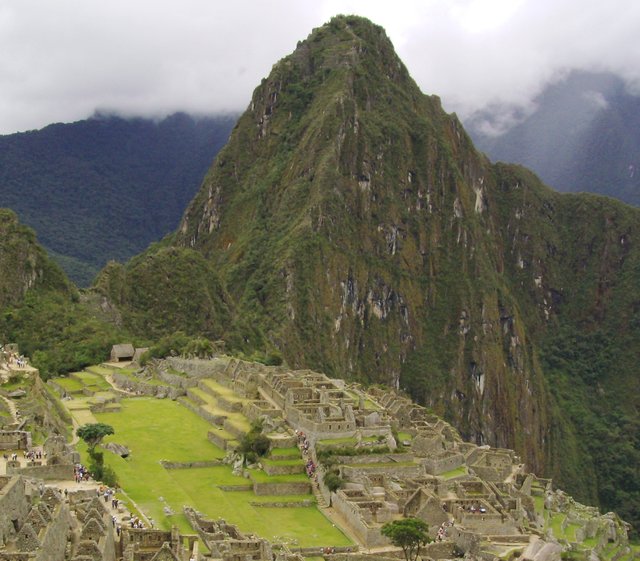
My wife and I have been traveling internationally for several years. We never purchased trip insurance prior to our trip to Peru. Most of our trips were leisure-oriented and were a bit fluid, allowing us to change plans if needed. So the need for trip insurance never really struck me. That is, until we traveled to Peru. In Peru, we had a set itinerary, a travel agency lined up and pre-purchased attractions. We also had domestic flights and connections by bus. It was a complicated trip that needed a bit of precision. It was one of those trips where everything seemed to go off course.
The problems started shortly after we left the airport. My wife was robbed at knifepoint. The bandit made off with her purse, phone and both of our passports. The theft caused us to lose a day of our vacation, which we spent at the police station making a report followed by a trip to the embassy to get our temporary passports. The purse and contents were worth about 200 dollars. The phone was worth 500 dollars. The temporary passports and passport photos were approximately 250 dollars. We were already nearly one thousand dollars in the hole without counting the non-refundable trip we had already paid for to swim with the seals. We missed that trip and did not get a refund.

After arriving in Cusco the following day, we had to visit the customs office and get a new visa stamp, as well. The visa stubs were in our passports, where most people keep them. There was an additional fee as well as costing us a couple hours of touring time. When we finally made it to Ollantaytambo, ready for the pinnacle of our trip...Machu Picchu...there was an earthquake which caused a rock slide over the train tracks. No trains were running that day, delaying us by another day. Luckily we had an extra day before our international flight home. We had to cancel our hotel in Lima, which did not cost us anything, luckily. We had to book a new hotel in Ollantaytambo, which did cost us something. Also, our return flight from Cusco to Lima had to be postponed one day. The airline that I had booked on was already sold out for that day and we didn't have another day to wait. So I also had to pay for two one-way tickets to Lima, which was another 300 dollars. Altogether, delays and replacements cost us 1 1/2 days of travel and nearly 1500 dollars. We did get to see Machu Picchu, which kind of made it worthwhile. But it was a hard lesson learned.
So, do I recommend that you get Trip Insurance? It depends.
##Are your travel plans flexible?
If you have flexible travel plans and no prepaid itinerary items, you may not need travel insurance. If you are traveling to another country to spend one week on the beach, you are probably okay without insurance. If your luggage is delayed, you will likely get a small stipend from the airline. Insurance would be a lot more, is it worth the cost of the insurance if that is the extent of your concerns? Probably not. If you are booked in a beach hotel, changing dates could be a problem in peak season. So, if weather may be an issue or you are concerned about flights and would have trouble rebooking the hotel for a few days later, it is likely worth considering. The more flexible your plans are, the less likely you need insurance.
##Is your trip complex?
If you are visiting multiple cities on your itinerary, particularly if you have domestic flight connections, it is time to start seriously considering insurance. The more complex your travel plans are, the more that can go wrong. Airlines go on strike, luggage gets lost, hotels get booked, connections get missed, documents get misplaced, injuries or illnesses happen. In addition to these factors, insurance often covers other issues that may be out of your control like illness prior to your trip or being called to serve on jury duty. Some of these factors can be determined ahead of time, while other factors are pure chance. So I would suggest examining the known factors and determine their complexity. The more complex your trip, the greater chance you will miss a connection, lose your luggage or experience delays. Insurance generally addresses all of these issues as well as those that are a matter of chance.
##Can you afford to cover your own expenses?
If your travel is complex, but you can cover minor expenses and don't mind missing part of your journey, it may not make sense to get insurance. You may choose to leave responsibility for arriving at your destination up to the airline. If you can afford delays, the airline will normally cover the cost of a hotel if it is a strike situation. Lost or delayed luggage may also have some limited reimbursement from the airlines. Some hotels will not charge you if you know within 24 hours that you will be delayed, so that may not be an issue for you either. If you are not worried about the other issues covered by insurance, it may make sense to cover your own expenses. I generally pay about 150 dollars to cover a four thousand dollar trip. The insurance coverage is far greater than just the cost of the trip, so that cost covers a lot more than just travel delays and lost luggage. However, it may make sense to you not to spend that 150 dollars if you are expecting that any out-of-pocket expenses will be less than 150 dollars. Over several trips of not using the insurance, that money adds up.
##Do you like having a security blanket?
My wife and I take an annual trip that involves numerous locations at our destination. A lot can go wrong. We used to do all of the planning ourselves, but now use a travel agency for efficiency. The travel agency will run static most of the time in the event there are disruptions in travel. That is an extra layer of security. But we also like the security blanket offered by insurance. It does not add excessively to the cost of our trip and the added benefits go far beyond just replacing lost luggage or covering travel disruptions. The medical coverage alone is a nice security blanket. Based on my personal preferences and the complexity of my foreign travel, I have been purchasing travel insurance for several years. I still have not spent anywhere close to what we lost on our trip to Peru. Travel insurance would have covered our expenses as well as paying us for our missed vacation days.
##Travel Insurance Snapshot
You can usually tailor your travel insurance to your own needs. There are a variety of insurance levels that are standard and are usually tiered into silver, gold and platinum (or good, better and best) depending on the policy. The policies include health insurance, so the ages of all travelers under the policy will affect the overall cost as well. Here are some examples of coverage for a four thousand dollar trip for two people in their early 50s:
The basic plan would run about 120 dollars. Coverage would include:
Trip Cancellation- Trip Cost
Trip Interruption- Trip Cost
Missed Connection- $500
Travel Delay- $500
Meal/Accommodations Sublimit- $100 Per Day (Minimum Delay Time- 6 hours)
Cancel For Any Reason Not Included
Medical Expense- $25,000
Medical Evacuation- $50,000
24/7 Travel Assistance Included
Non-Medical Evacuation- $25,000
Accidental Death/Dismemberment except Air Flight- $10,000
Accidental Death/Dismemberment Flight Coverage $10,000
Baggage & Personal Effects- $500 (100 dollars per day, per bag after a 12-hour delay)
A gold level plan would run $144 dollars for the cheapest available plan:
Trip Cancellation Trip Cost
Trip Interruption 150% of Trip Cost
Missed Connection $1,500
Travel Delay $1,000
Meal/Accommodations Sublimit $200 Per Day (Minimum Delay Time 8 hours)
Cancel For Any Reason Not Included
Medical Expense $100,000
Medical Evacuation $250,000
24/7 Travel Assistance Included
Non-Medical Evacuation $25,000
Accidental Death/Dismemberment except Air Flight $50,000
Accidental Death/Dismemberment Flight Coverage $50,000
Baggage & Personal Effects $2,000 ($150 per bag x 2 following a 12 hour delay)
I generally go with the gold plan, which is fairly comprehensive and has plenty of coverage. A platinum plan using the same criteria would run $212:
Trip Cancellation Trip Cost
Trip Interruption 150% of Trip Cost
Missed Connection $2,500
Travel Delay $1,250
Meal/Accommodations Sublimit $250 Per Day (Minimum Delay Time 8 hours)
Cancel For Any Reason 75% to 100% of Penalty Amount (See Certificate)
Medical Expense $100,000
Medical Evacuation $500,000
24/7 Travel Assistance Included
Non-Medical Evacuation $25,000
Accidental Death/Dismemberment except Air Flight $50,000
Accidental Death/Dismemberment Flight Coverage $100,000
Baggage & Personal Effects $2,500 (250/500 per day following a 12 hour delay)
This coverage also provides rental car coverage up to 30,000 dollars for damage to a vehicle.
There are a variety of issues discussed in greater detail within the individual documents, but they tend to cover the exact same topics. They include the circumstances for travel delays, baggage delays, etc. The coverage tends to be fairly comprehensive, but not every circumstance is covered. For normal travelers, standard insurance is going to address the majority of issues for delays or illness.
##Should I Purchase Trip Insurance?
Returning to the question first posed, when should you consider purchasing travel insurance? Everyone is different, but I would suggest considering the following issues to help you determine if you should consider it:
- Your travel plans are complicated
- There is a chance of weather delays at your departure
- There is a change of weather disruptions at your destination
- You are traveling to areas where illness may become a concern
- You are concerned about health issues arising during travel
- You like to have an added layer of security
- Your travel plans are not flexible
- Your travel is not budget related, creating more expenses if there are changes
There are quite a few different vendors who sell trip insurance. There are also quite a few vendors who research the cost and offer comparison shopping to travelers. I generally use Tripinsurance.com to compare and purchase insurance. There are several reasons I like using this resource, which I have used for four trips now. First, the rate comparisons were lower than other comparison sites I used. Second, the prices were cheaper or the same as the quotes I received going direct to the same vendors that showed up during my search. Third, Tripinsurance.com provides updates on travel related issues at your destination prior to your departure. They provide updates on weather, strikes and threats from the time you purchase your trip until the trip is complete. Finally, I have been happy with them having used them several times.
If you travel quite a bit, you probably already have your own system in place to make your trip as interference free as possible. Whether you use trip insurance or not, it is good to consider if you are taking a trip that involves greater risk.



